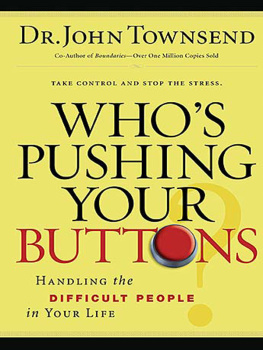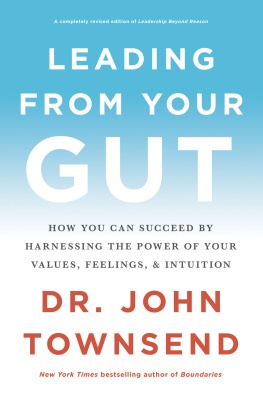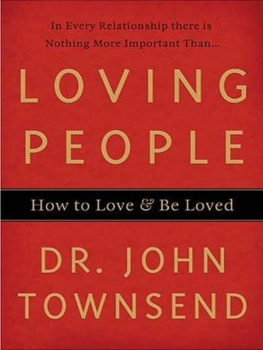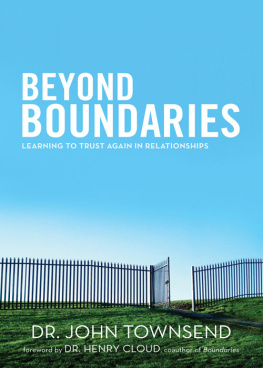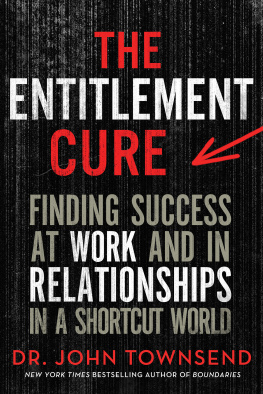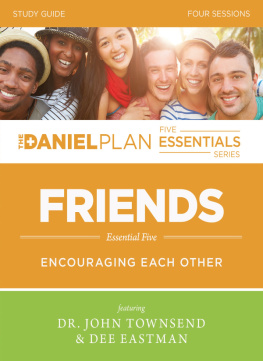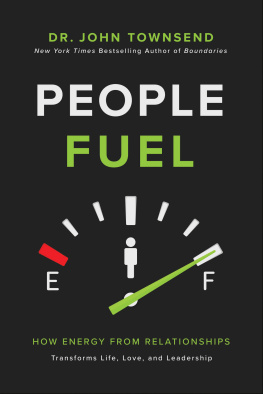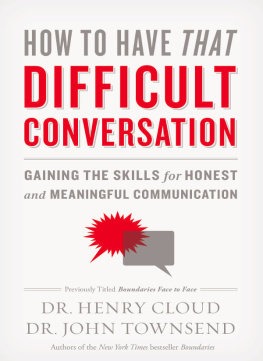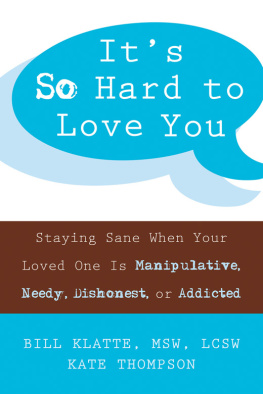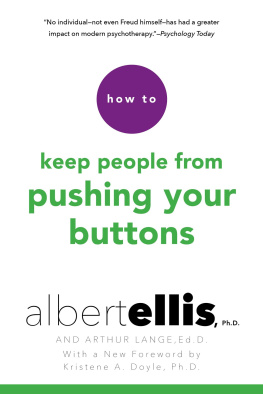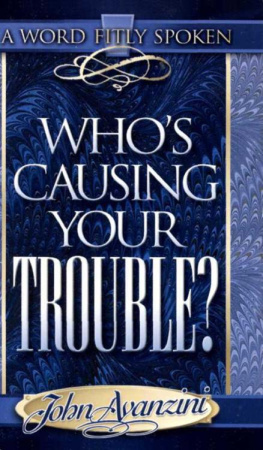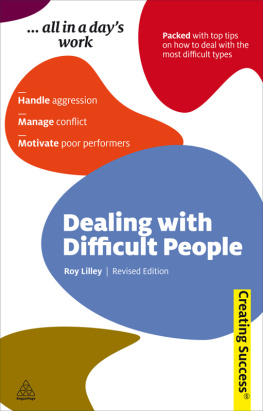
WHOS
PUSHING
YOUR
BUTTONS?
HANDLING the
DIFFICULT PEOPLE
in YOUR LIFE
DR. JOHN TOWNSEND

WHOS PUSHING YOUR BUTTONS?
Copyright 2004 by John Townsend.
Published in Nashville, TN, by Thomas Nelson. Thomas Nelson is a trademark of Thomas Nelson, Inc.
HELPING PEOPLE WORLDWIDE EXPERIENCE the MANIFEST PRESENCE of GOD.
All rights reserved. No portion of this book may be reproduced, stored in a retrieval system, or transmitted in any form or by any meanselectronic, mechanical, photocopy, recording, or any otherexcept for brief quotations in printed reviews, without the prior written permission of the publisher.
Thomas Nelson, Inc. titles may be purchased in bulk for educational, business, fund-raising, or sales promotional use. For information, please e-mail SpecialMarkets@ThomasNelson.com.
Published in association with Yates & Yates, LLP, Literary Agents, Orange California.
Unless otherwise indicated, Scripture quotations used in this book are from The New International Version, copyright 1973, 1978, 1984 by International Bible Society. Used by permission of Zondervan Bible Publishers.
Other Scripture quotations are taken from the following sources: New American Standard Bible (NASB), copyright 1960, 1977 by the Lockman Foundation.
Cover Designer: Benjamin Kinzer, Brand Navigation, LLC
(The Office of Bill Chiaravalle) | www.brandnavigation.com
Interior: Design: Inside Out Design & Typesetting
Library of Congress Cataloging-in-Publication Data
Townsend, John Sims, 1952
Whos pushing your buttons? / by John Townsend.
p. cm.
ISBN 10: 1-59145-010-1 (hardcover)
ISBN 13: 978-1-59145-010-8 (hardcover)
1. Interpersonal conflictReligious aspectsChristianity. I. Title.
BV4597.53.C58T69 2004
248.4dc22
2004008238
Printed in the United States of America
07 08 09 10 11 QW 9 8 7 6 5 4
To all who are today in a difficult relationship,
and wish for better days.
May God bless you.
CONTENTS
1. The View from the Inside:
How Button-Pushers Are Hardwired
2. Diagnosing the Disease:
Understanding Your Specific Situation
3. Clear the Deck:
Understanding Your Failed Attempts
4. Developing a Vision for Change:
Your Personal Starting Point
7. Resource #3: Others
(Safe and Sane Relationships)
B YRON WILLIAMSON: For your vision and partnership in publishing. You believe in the process of writing and are a leader in thinking about ways to reach people with books.
Joey Paul: For adding such value to writing and publishing. Your support and rich background have been invaluable.
Rob Birkhead: For your creativity and ability to convey ideas through the visual process. Your work is appreciated.
Sealy Yates, my agent: for being for me all these years of writing, and being a pioneer in helping people find Gods grace through publishing.
Jeana Ledbetter, my literary representative: for catching the vision for this book early, and providing perspective on its creation.
Anita Palmer, my editor: for your competency and care in restructuring thoughts into words that communicate best what should be said.
Dr. Henry Cloud, my friend and partner: for your involvement in the thinking behind the book, and your years of service to God in his calling to help people find him.
Kris Bearss: for your concern and conscientiousness that the written word be accessible and clear to the reader.
Maureen Price and the Cloud-Townsend Resources staff: Thanks to Jodi Coker, Kevin Doherty, Belinda Falk, Kris Patton, and Raul Pea for your care, your dedication, and your values that have made so much of a difference.
The staff of Cloud-Townsend Clinic: Dr. John Barrett, Dr. Sharon Bultsma, Laura Crutchfield, Dr. Fran Rodenburg, Brett Veltman, and Josh Wilson, for your training and heart in helping those who need to find healing, to experience it.
Steve Arterburn, Mike Marino, and the staff of New Life Ministries: Paul Barnes, Jamie Clark, Jo Crisp, Maureen Fraser, Sue Haffely, Steve Lee, Terry McIntosh, Karen Mendoza, Dianne Nelson, Larry Sonnenburg, and Lisa Voyen, for your support and commitment to using radio and media as a positive way to help people.
Mike Coleman: for your leadership and engagement in beginning a publishing arm which could help others grow in Christ.
The attendees of Monday Night Solutions at Mariners Church, Irvine, California: for your desire to grow relationally, spiritually, and emotionally.
Drs. Bruce Narramore, John Carter, and Phil Sutherland: for helping me learn character diagnostics at a deep level.
The faculty of Dallas Theological Seminary: for providing me with the tools to understand scriptural thought.
Tom and Martha McCall and Ted Trubenbach: for your years of safe and sane personal support.
Denis Beausejour: for your involvement in my life beyond ministry.
Dr. Bob Bey, John and Laurie Carpenter, Chuck Fay, and Dr. Eric Prouty: for helping me not to forget the right side of my brain.
My wife, Barbi, and our sons, Ricky and Benny: for being the best family I could ask for.
INTRODUCTION:
HAVE BUTTONS, WILL PUSH
L ETS BEGIN WITH A LITTLE REALITY CHECK. Are you in a relationship with someone that often results in you feeling significant amounts of the following?
Frustration?
Helplessness?
Fear?
Alienation and isolation?
Anxiety?
Out of control?
Unloved?
Guilt?
Confusion?
Anger?
This is not a complete list by any means. But if you find yourself here, it may convey that something in this relationship causes significant problems for you, and perhaps for others as well. It is as if aspects of that persons behavior, words, or attitudes have the power and capacity to change your own mood, your happiness, and even your quality of life.
It could certainly be that these reactions are more about you than the other person. That is always something to check out, for example, by seeing if safe and sane people have similar reactions to this person, or by asking others for feedback about your own style of relating. But if it is true that the person is, in objective reality, doing lots of crazy-making or even destructive things in your relationship, you may be dealing with a button-pusher.
A button-pusher is someone who causes many negative reactions in his relationships. There are two parts to the equation: the button-pushers crazy-making tendencies, plus your own vulnerabilities to him or her. The material in this book has been designed to give you the tools to not only understand your situation, but also to develop an approach to the relationship to both influence that difficult person to change in positive ways, and help you change and grow also. Lets look at some examples from life that can flesh out the picture.
THE DINNER FROM MISERY
My wife, Barbi, said to me one evening, Linda and Jim invited us to dinner. Lets do it. I was up for it. I liked Linda. I had never met her husband, Jim, but dinner sounded OK to me. Calls were placed and plans made, and within a couple of weeks we were at their home.
As we talked over dinner, I liked Linda even more. She was warm, intelligent, and funny. She was easy to get to know, and was one of those people who naturally reaches out and puts people at ease.
Next page
